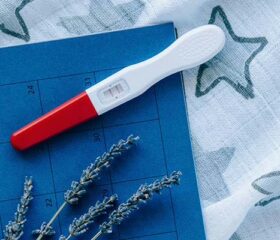What Factors Affect Fertility in Men and Women?
Learning about the factors that affect fertility can improve your chances of getting pregnant.

If you’re planning to have a baby, especially if you’ve already started trying to conceive, it’s a good idea to understand what could get in your way.
In this article, we’ll explain the main factors that can affect fertility, when you should see a fertility specialist, and what the most common infertility treatment options are.
What is fertility?
Fertility is your natural ability to get pregnant (if you’re a woman) or get your partner pregnant (if you’re a man). Fertility varies from person to person and couple to couple; some people have an easier time getting pregnant than others.
Several factors may affect your fertility, some of which are largely in your control, some of which are outside it. They include:
- How old you are
- How healthy your lifestyle is
- Whether you have certain medical conditions or are on certain medications
We’ll talk in detail about these factors below.
How fertile are most couples?
Most people don’t get pregnant the first time they try. 1 On average, couples who are actively trying to conceive have a 30% chance of getting pregnant within 1 month and a 75% chance of getting pregnant within half a year (6 months).
What is infertility?
Your doctor may diagnose you with infertility (meaning it’s significantly harder than average for you to conceive) if you’ve been trying for over a year without any success. 2
As mentioned, you can overcome some factors that can negatively affect fertility with simple lifestyle changes. You may need medical intervention for others.
Thankfully, these days, there are many infertility treatments to help people who are struggling to have a baby.
How does age affect fertility?
Age is possibly the most significant factor that affects fertility. The older you get, the less fertile you become. While this is true for both sexes, it’s especially apparent in women.
Here’s how age affects fertility in:
- Women: A woman’s egg quality and quantity will naturally decline as she ages. This will usually accelerate in her mid to late 30s. Aging also makes women more likely to have a miscarriage or a child with a genetic disorder. 2
- Men: Sperm quality and quantity may also decline as men age. Men have a higher chance of facing infertility after they turn 40 years old. 2
What lifestyle factors affect fertility?
Some of your daily habits and life choices can affect your fertility. They include: 3
- Weight: Being overweight affects fertility in both men and women. For women, being underweight also affects the chances of conceiving. Managing your weight through diet and exercise can significantly improve your chances of conception, so ask doctor for recommendations on what to eat to get pregnant faster and what exercises to include in your pre-pregnancy workout plan.
- Medication: Infertility is sometimes a side effect of medication. For example, cimetidine and nitrofurantoin may affect male fertility, while chemotherapy drugs can affect both male and female fertility. (This doesn’t mean you shouldn’t take those drugs if your doctor has ordered them; follow their advice, but let them know if you have concerns about how your prescribed treatments may affect your fertility.)
- Recreational drugs, smoking, and alcohol: You should quit smoking while you’re trying to conceive. Use of other recreational drugs (e.g., marijuana, cocaine, etc.) and alcohol can also all damage your fertility, as well as your overall well-being.
Schedule a preconception appointment with your doctor to help you narrow down and address any potential issues.
It isn’t clear whether caffeine intake affects fertility
Currently, there isn’t enough evidence to confirm whether or not caffeine consumption (coffee, tea, soda, etc.) affects fertility. However, some experts still suggest that women trying for a baby cut down their caffeine intake to fewer than two cups (500 mL) of coffee or five cans (2 L) of soda per day.
What medical conditions affect fertility?
Some medical conditions affect fertility. This includes health issues that don’t directly relate to the reproductive organs, such as thyroid disorders and (in women) vitamin D deficiency. 4 It also includes reproductive-specific conditions.
Medical conditions that affect female fertility
The following medical conditions affect women’s reproductive organs and thereby fertility:
- Polycystic ovary syndrome (PCOS): A type of hormonal disorder, PCOS can lead to irregular or absent ovulation. It’s one of the most common causes of female infertility, but it’s not insurmountable; you can still get pregnant with PCOS, especially with fertility treatments. 5
- Primary ovarian insufficiency (POI): Also known as premature ovarian failure, this is when a woman’s ovaries stop working before she turns 40 years old. 6
- Blocked fallopian tubes: Conditions like pelvic inflammatory disease (often a complication of an STD) or endometriosis (where uterus lining-like tissue grows outside the uterus) can cause damage or blockages in the fallopian tubes. 7 8
- Uterine fibroids: These are typically non-cancerous tumors that grow in the uterus. Occasionally, they may cause infertility. About one in five women gets uterine fibroids during her childbearing years. 9
Medical conditions that affect male fertility
For men, damage to the testicles can affect sperm production and movement. 9 The other conditions that can affect male fertility include:
- Varicocele: This is when the veins inside the scrotum swell and heat the testicles. It can lower sperm count and affect sperm shape (abnormally shaped sperm may not be viable). 10 9
- Cystic fibrosis (CF): A genetic disorder, CF is the buildup of mucus in the lungs, digestive tract, or other body parts. 11 Up to 97–98% of men with CF are infertile. 12
When should you see a doctor for infertility?
There’s no definitive answer as to how long it takes to get pregnant. For most couples under 35, the general guideline is to see a doctor if you’ve been trying to conceive for at least a year, meaning you’ve been having regular, unprotected intercourse without success. 2
If you’re older than 35, the guideline is 6 months.
However, you shouldn’t wait to see a doctor if you have a higher risk of infertility. Below are infertility-related circumstances specific to men and women.
Women with a higher risk of infertility
Women in one or more of the following situations should see a doctor right away: 2
- Very painful periods
- Irregular or no periods
- Other known conditions related to the reproductive system
- A history of miscarriage
Men with a higher risk of infertility
Men should see a fertility specialist if they have: 2
- Trauma to their testicles
- Previous hernia surgery
- A history of infertility with another woman
- Previous chemotherapy treatments
- Sexual dysfunction
- Known genetic conditions related to infertility
Treatments for infertility
If you’re young and healthy, your doctor might just ask you to make some lifestyle adjustments (like including foods that can boost your fertility to your diet) or teach you how to time intercourse (especially if you’re trying to get pregnant with an irregular cycle, since it’s much harder to track ovulation with irregular periods).
Your doctor may also schedule a type of transvaginal ultrasound called a saline infusion sonogram (SIS) to determine what could be causing fertility issues. This involves filling your uterus with a saline solution, which allows your doctor to check for any abnormalities.
Many women claim that fertility may increase after SIS, although it’s just a test and isn’t actually a fertility treatment itself.
If you need dedicated medical fertility treatments, your doctor may suggest one of the following: 2
- In vitro fertilization (IVF): This involves retrieving eggs from your ovaries and fertilizing them with sperm in a laboratory dish. After fertilization, your doctor will transfer the embryos into your uterus.
- Intrauterine insemination (IUI): Also known as artificial insemination, IUI is when your doctor places sperm directly into your uterus when you ovulate.
IVF and IUI are the most common types of medical fertility treatments. If using your own egg or sperm isn’t an option, your doctor might put using donor eggs, sperm, or even embryos on the table.
Can timing your intercourse affect fertility?
Timing your intercourse doesn’t make you more or less fertile, exactly. However, like we just alluded to, it makes it possible to pinpoint when you’re most fertile and plan intercourse accordingly.
Conception is most likely to succeed when you have sex shortly before you ovulate (i.e., release a mature egg to be fertilized). This is known as your “fertile window.”
Ovulation typically happens around day 14 in a normal 28-day menstrual cycle. The egg hangs around waiting to be fertilized for 12–24 hours, and sperm can remain viable for up to 5 days. 13 This means your fertile window includes the 5 days before you ovulate and the day afterward.
Women can identify their fertile window with tools like ovulation calculators and by looking out for ovulation symptoms (e.g., spotting or ovulation fatigue). If you think you’re ovulating, you can use an ovulation test strip to confirm.
Final thoughts
Understanding what factors affect fertility is important if you’re trying for a baby. It also helps you assess if you’re making healthy lifestyle choices, since maximizing your fertility often boils down to taking good care of yourself.
If you’re struggling with infertility, remember that you’re not alone and that you can always seek medical help.
Article Sources
- BMJ. "Extent of the problem" Retrieved June 17, 2025.
- U.S. Centers for Disease Control and Prevention. "Infertility: Frequently Asked Questions" Retrieved June 17, 2025.
- MedlinePlus. "Infertility" Retrieved June 17, 2025.
- UC San Diego Health. "Thyroid Disorder Care" Retrieved June 17, 2025.
- MedlinePlus. "Polycystic Ovary Syndrome" Retrieved June 17, 2025.
- MedlinePlus. "Primary Ovarian Insufficiency" Retrieved June 17, 2025.
- MedlinePlus. "Pelvic inflammatory disease (PID)" Retrieved June 17, 2025.
- MedlinePlus. "Endometriosis" Retrieved June 17, 2025.
- Office on Women's Health. "Infertility" Retrieved June 17, 2025.
- MedlinePlus. "Varicocele" Retrieved June 17, 2025.
- MedlinePlus. "Cystic fibrosis" Retrieved June 17, 2025.
- Cystic Fibrosis Foundation . "Fertility in Men With CF" Retrieved June 17, 2025.
- MedlinePlus. "Pregnancy - identifying fertile days" Retrieved June 17, 2025.






